Guide to Turkey Digital Nomad Visa: Your Passport to Freelancing by the Sea
Explore how to live in Turkey legally while working remotely. This 2025 guide covers the digital nomad visa, costs, and process.
August 9, 2025
August 9, 2025

Thinking about working remotely from Turkey? You’re not alone. With its vibrant culture and everything from beach towns to bustling cities, Turkey is quickly becoming a favourite spot for freelancers and remote workers.
The Turkish digital nomad visa makes it possible to live there legally while working remotely for foreign clients or companies. In this guide, we’ll cover everything you need to know, from eligibility requirements to costs and the application process, so you can plan your move with confidence.
What is the Turkey digital nomad visa?
First of all, what is a digital nomad visa? It’s a type of residence permit that allows remote workers to live in a foreign country while working for an employer or clients based abroad. It’s designed for freelancers, entrepreneurs, and remote employees who want to explore a new place without breaking immigration laws.

Turkey officially launched its Digital Nomad Visa program in April 2024. It was introduced as a new immigration pathway specifically for remote workers from eligible countries who want to live in Turkey while working online.
Is it a real visa or a residence permit?
It’s a two-step process. To get it, you’ll first apply online for a Digital Nomad Identification Certificate. Once approved, you’ll take that certificate to a Turkish consulate or visa center in your country to apply for the Digital Nomad Visa. Then, you can enter Turkey on this specific visa.
Once you arrive in Turkey, you can apply for a residence permit based on your nomad visa.
I’ll explain the process in more detail in this article.
Why remote workers are eyeing Turkey in 2025
Turkey is still one of the most interesting places to live and work remotely. And I would know — I spent three years in Istanbul, albeit on a different kind of residence permit. It might not be the bargain it once was: with inflation and currency swings, living costs have gone up in recent years, especially in major cities.
But it’s still attractive for foreign workers. Good weather, great food, a rich culture, strong cafe and coworking scenes, and a growing expat community make Turkey worth the higher price tag for many. With the digital nomad visa, the country is finally giving remote workers a clear legal path to stay longer than 90 days — and that alone is a big deal in a region full of tourist visa limits and grey zones.
I’ve been living in Izmir since March 2024. Before that, I was in Bodrum.
Turkey stopped issuing tourist residence permits in December 2022. Ironically, I applied right at that moment — and to avoid being rejected, I withdrew my documents. What followed was a long 1.5 years of doing visa runs. Unfortunately, I didn’t qualify for other types of residence permits, like those for property owners, students, or medical reasons.
When I found out in April 2024 that Turkey had launched a digital nomad visa, it felt like my only hope of legalising my stay in the country.
{{Maria Petrova}}
Who’s eligible for the Turkey digital nomad visa?
Here are some quick facts about this new type of visa and program.
Age and nationality restrictions
Not everyone is eligible for Turkey’s digital nomad program. You have to be between the ages of 21 and 55.
The list of approved nationalities is limited too, so make sure to check if your country is included before applying. Here’s the full list of eligible countries: France, Germany, Italy, Belgium, the Netherlands, Luxembourg, Ireland, Denmark, Greece, Croatia, Spain, Portugal, Austria, Finland, Sweden, the Czech Republic, Hungary, Poland, Slovenia, Slovakia, Estonia, Latvia, Lithuania, Malta, Bulgaria, Romania, Norway, Iceland, Liechtenstein, the United Kingdom, Switzerland, the USA, Canada, the Russian Federation, Ukraine, and Belarus.
Income requirements
To qualify for Turkey’s digital nomad visa, applicants must prove a monthly income of at least $3,000, or an annual income of $36,000. This income should come from remote work for a company registered outside Turkey or from freelance/self-employed work with international clients.
Education
You must have a university degree. A diploma or graduation certificate will be required during the application.
What documents do you need to apply?
Before you start the application, make sure you’ve gathered all the required paperwork. You’ll need to prove you’re working remotely, earning enough, and meet Turkey’s eligibility criteria. Here’s what to prep.
Proof of remote work and income verification
To qualify for Turkey’s digital nomad visa, you’ll need to show that you earn a stable income from remote work or freelance contracts — outside of Turkey. The official platform asks for:
- A contract if you’re remotely employed by a foreign company,
- Or a business agreement if you’re self-employed and working with international clients.
These documents should clearly state your role, the nature of your work, and ideally your income.
On top of that, you must prove that you earn at least $3,000 per month or $36,000 per year. To do this, you must provide proof of income.
Right now, pretty much any documents can be accepted. If someone earns income in cryptocurrency, we apply with invoices. If it’s official income, then bank statements work.
{{Özgür Özcan}}
Other documents required
According to the official GoTurkiye website, here are the other documents you need to apply for the visa, aside from your contract and your proof of income.
- A passport or a travel document that’s valid for at least 6 months as from the date of your arrival in Turkey
- A diploma or Certification of Degree document showing that you are a university graduate
- A biometric photo
In practice, more documents may be required. They include:
- Proof of a clean criminal record. This document is usually issued by the authorities in your country of residence.
- International health insurance coverage.
How to apply for the Turkey digital nomad visa
Many prospective applicants are confused by how the process actually works, especially since it’s a relatively new program and involves multiple steps across online platforms, embassies, and immigration centers. We know bureaucracy is tough (and Turkish bureaucracy is extra tough), so this article will walk you through the whole thing step-by-step. And if you can afford it, legal support is highly recommended.
At this point, the program has stabilized, and I don’t see a high number of refusals. But many freelancers underestimate the complexities of Turkish bureaucracy. Migration officers themselves are sometimes unfamiliar with the digital nomad visa and unsure of what to ask for. Requirements also vary by province and migration office.
One of the most common mistakes is applying without professional support — many issues arise simply because applicants don’t consult a lawyer. In Turkey, even government offices often can’t give you an up-to-date list of required documents, since things change frequently. That’s why it’s worth double-checking everything with a legal expert.
{{Özgür Özcan}}
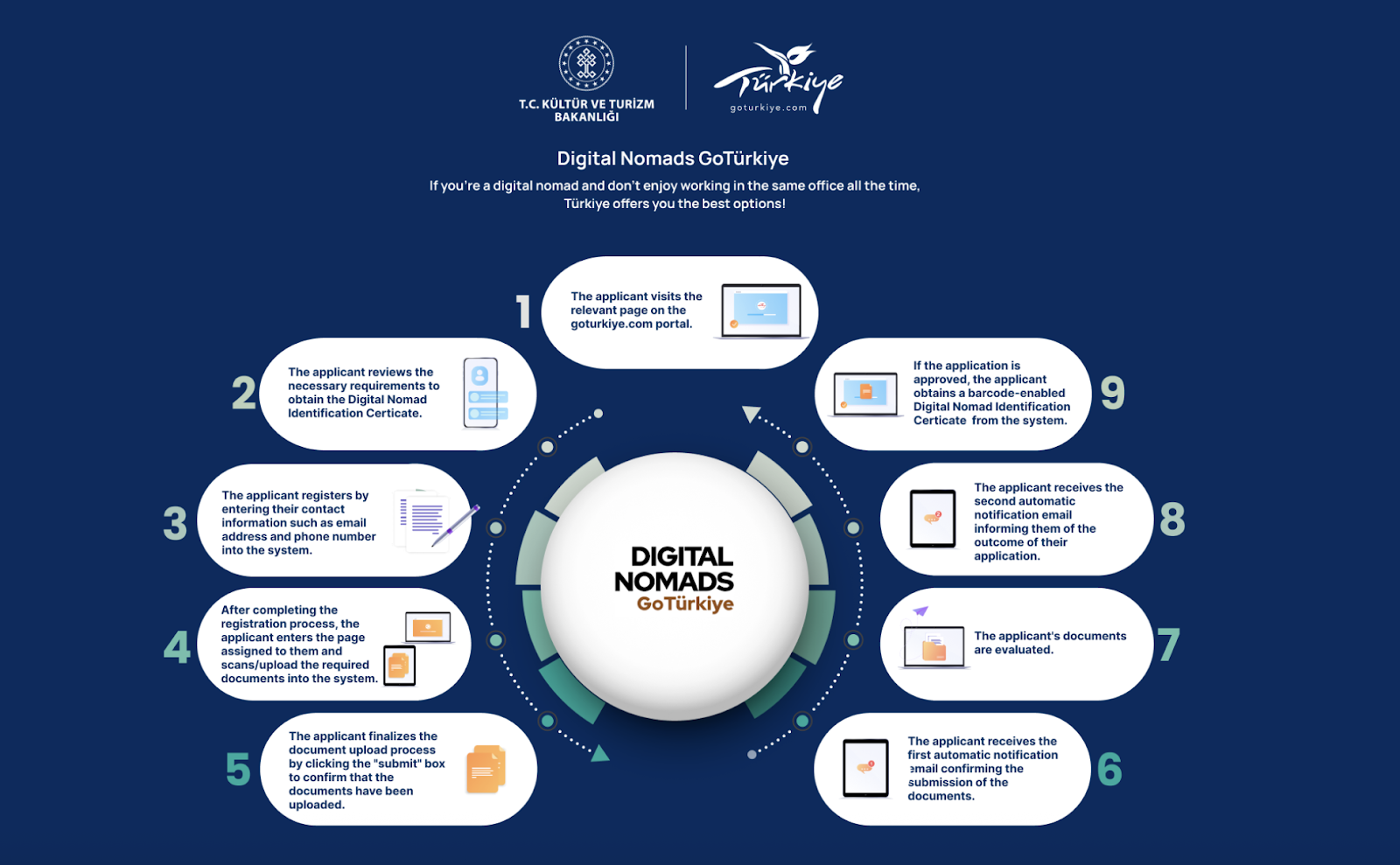
Step-by-step process
- Make sure you meet the basic requirements regarding your age, nationality, education, and salary that I outlined above.
- Gather all the documents mentioned earlier.
- Head to the official platform and create an account. Scan and upload your documents and wait for the platform to review them. Here’s what the interface looks like.
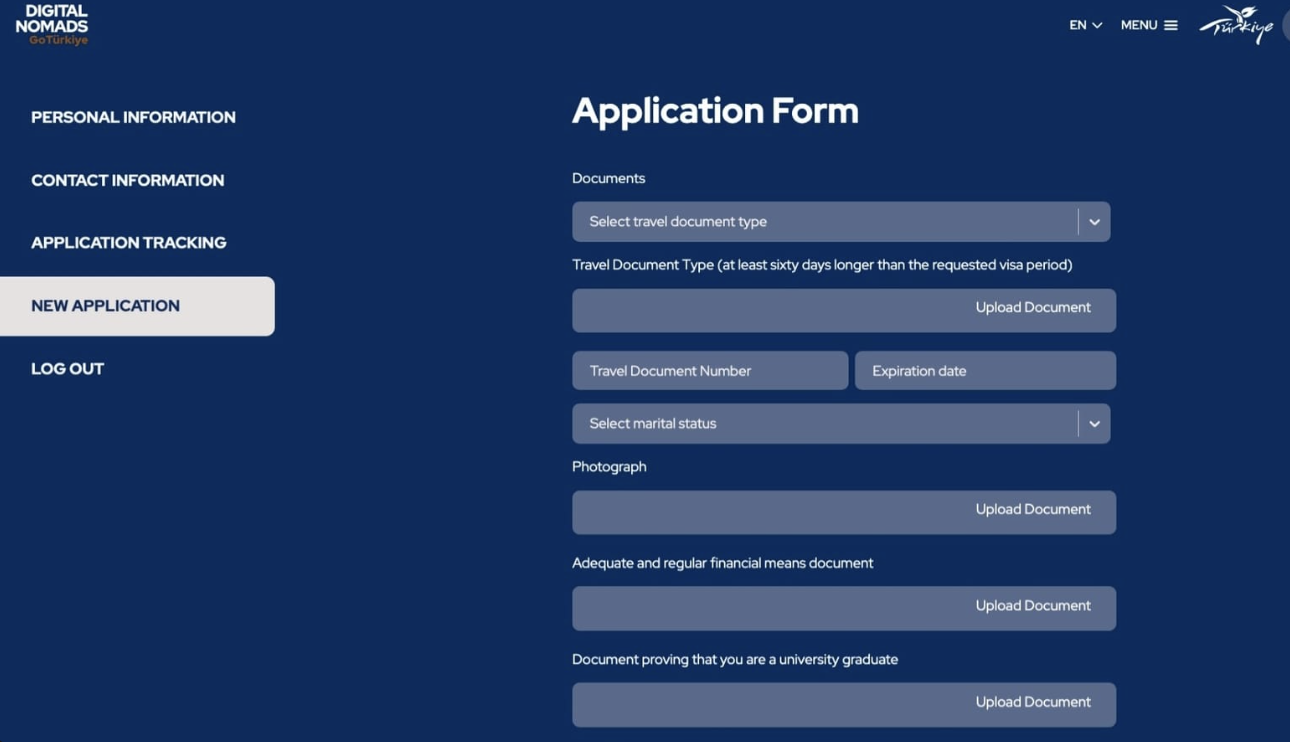
- If successful, you’ll receive a Digital Nomad Identification Certificate — a barcode-enabled PDF confirming your eligibility.
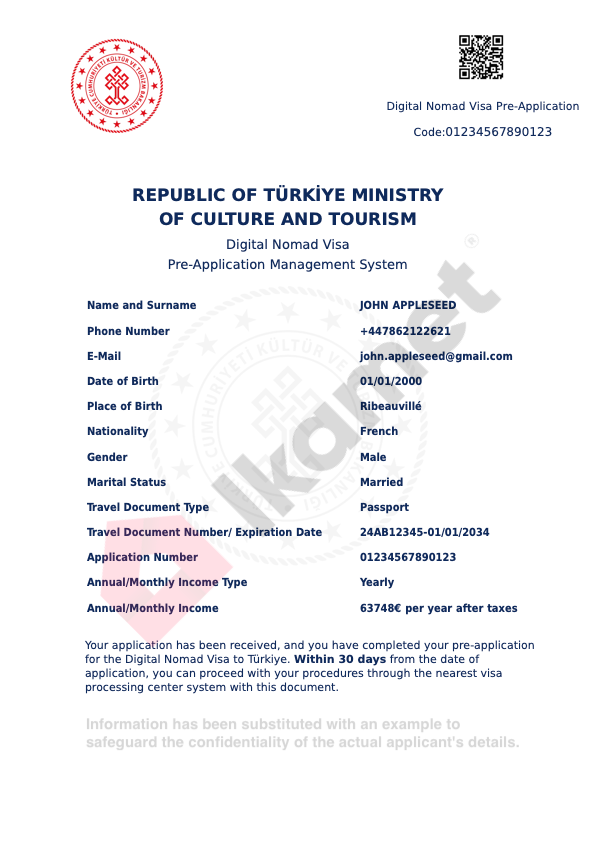
- Take your certificate and required documents to a Turkish consulate. Submit your visa application there. Keep an eye out for any messages from the consulate; sometimes they’ll contact you to request additional documents. After the online application, the visa process takes up to four weeks. Here’s what the 90-day, multiple-entry digital nomad visa will look like in your passport.
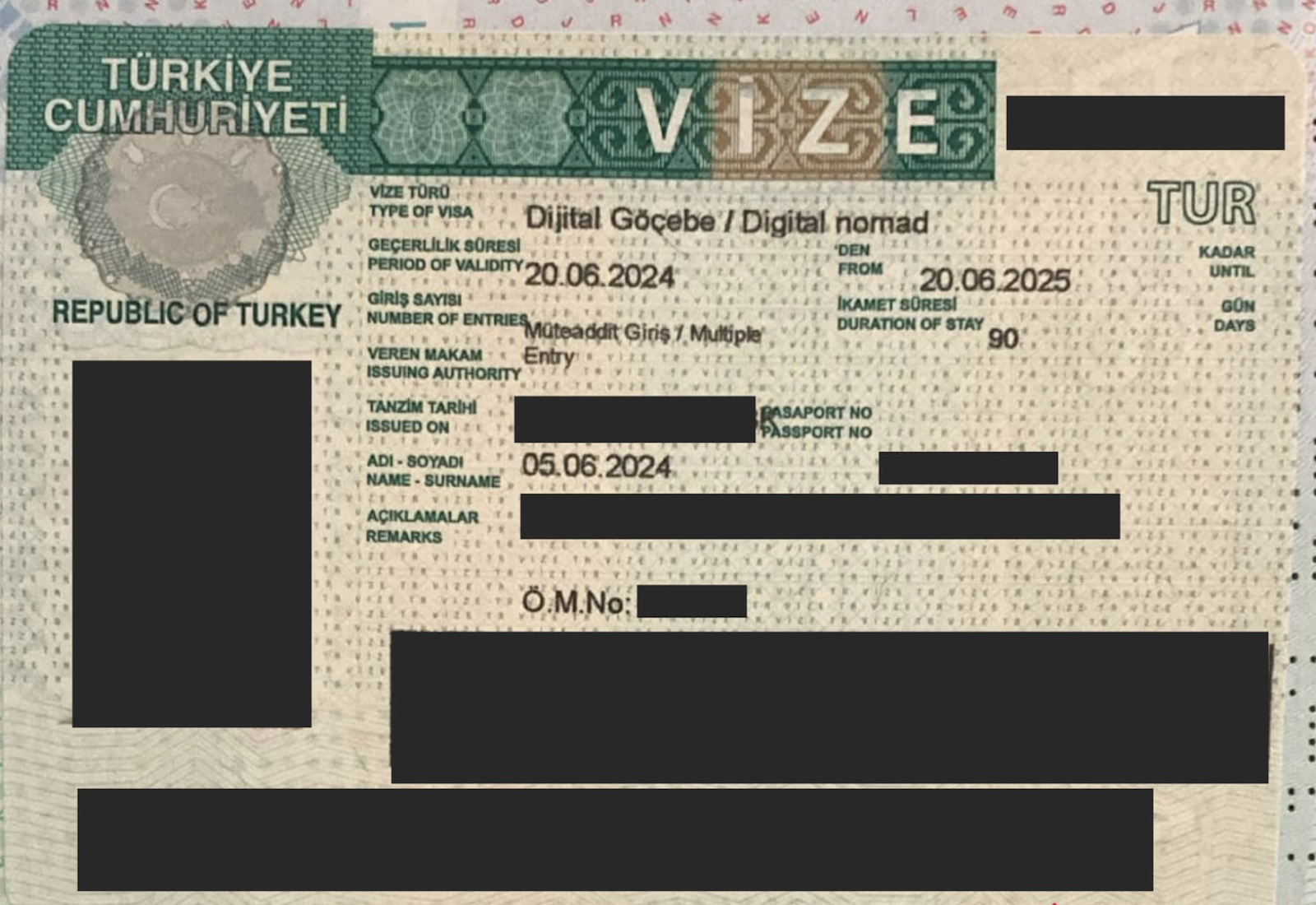
The visa (a sticker in the passport) is issued for 30 to 90 days. Any visa can be issued for a maximum of 90 days. You can check Law No. 6458, in the section about visas.
{{Özgür Özcan}}
Visa fees
The cost of the digital nomad visa varies by nationality. For example, according to the Turkish consulate in Los Angeles, a multi-entry visa costs 190 USD for US citizens at the moment. Check with your local consulate for more info.
Converting your visa to a residence permit
Just because Turkey issues 90-day digital nomad visas, it doesn’t mean that you have to leave the country on day 89. After you arrive, you can switch over to a residence permit by filing an application with a local immigration department.
After receiving the visa and entering Turkey, you apply for a residence permit at the local migration office. Once your documents are submitted, you’ll receive a plastic residence card, valid for 6 months to 2 years, depending on the province.
I can’t provide the full list of documents here — that’s part of our paid service, and we work with our own set of documents that we know ensures approval. But in short, that’s the general process.
{{Özgür Özcan}}
Dealing with Turkish bureaucracy as a foreigner is not the easiest thing in the world, though — and this is especially true for residence permits.
Maria first received her residence permit based on the digital nomad certificate in 2024, renewed it once, and later switched to a family permit after getting married.
No one — not the immigration office staff, not other immigrants — had any idea what to do. The website had extremely limited information.
When I first visited the immigration office in Izmir (there’s only one), they literally called me a fraud and said I had printed my [digital nomad] certificate at home on a colour printer.
At the time, nobody at the Izmir office knew how the process was supposed to work or what documents were needed. They simply weren’t ready to handle this new visa type.
{{Maria Petrova}}
After contacting the Turkish Ministry of Tourism, she was invited back to the office. This time, she was taken to a manager who, after some discussion, produced an official document confirming the existence of the digital nomad visa program. But even once the process officially began, it was far from smooth. Maria was repeatedly asked to provide additional documents — including ones that were difficult or impossible to obtain (such as an apostilled bank statement).
We decided that I would only go with a lawyer because, unfortunately, no one was willing to speak to me politely unless he was there. I ended up visiting the office every 3-4 days to submit more documents. It felt endless. Every time they came up with new requirements.
Most of these issues were resolved thanks to my lawyer.
By August 2024, I received approval and my residency card.
{{Maria Petrova}}
What if you’re in Turkey already?
Are you living in Turkey already and considering switching over to the digital nomad process? There’s a lot of conflicting information online about whether you can just skip the embassy step and apply directly for the residence permit at the local migration office. However, according to the local legal aid chats online, since 1 October 2024, you can’t convert your existing visa or permit into the digital nomad visa from inside the country.
Here’s what you need to do.
- Apply for the Digital Nomad Identification Certificate online.
- Take that certificate to a Turkish consulate abroad to apply for the actual digital nomad visa.
- Re-enter Turkey with the new visa and apply for a residence permit based on it.
So yes, that process entails leaving Turkey even if you’ve already been living here. But here’s a tip: if your home country is a long way away from Turkey, you don’t need to go all the way there and back. Many applicants choose a consulate in nearby countries, such as Georgia. Thankfully, once you’ve received your visa and successfully applied for a residence permit, you can extend it without going through the whole visa process again.
The good news is that once you have your residence permit, you can renew it without needing another visa.
{{Özgür Özcan}}
Living in Turkey as a digital nomad
The bureaucracy part is over — you got your digital visa and you converted it to a residence permit. Now it’s time to actually start living the digital nomad life.
Staying in Turkey happened by chance. I had actually planned to move to Spain and apply for their digital nomad visa — but for personal reasons, I’m still here. The climate is a huge plus — sunshine, sea, warmth year-round. After grey weather, it’s uplifting and even improves your health. And the people — turns out there are many kind, wonderful, open people here!
But there are difficulties:
- Opening a bank account is still pretty tough, but doable. I think if I didn’t have a Turkish husband, I’d be asked for a deposit or account-opening fee (about $200-300)
- Cultural and mindset differences are real, but that’s part of assimilation
- You really need to learn to let go and wait — nothing moves quickly here
- Language is essential. Not many people speak English, so to settle in comfortably, it’s worth learning Turkish (I’m still slowly working on it).
{{Maria Petrova}}
Best cities for remote work
Here are some of the best cities for remote workers in Turkey. Curious about rental prices? Check out local platforms like sahibinden.com or emlakjet.com to find long-term apartments.
Istanbul
If you thrive in big cities, Istanbul has everything, including coworking spaces, cool cafes, rich history, and a large international community. It’s the only major city in the world that spans two continents, and nothing beats crossing the Bosphorus by ferry, tea in hand.
Internet speeds are reliable for everyday work, public transport is extensive, and while English isn’t widely spoken everywhere, you’ll get by just fine in central areas. It’s not the cheapest option, but it’s by far the most dynamic and well-connected — you can fly practically anywhere in the world without a layover from Istanbul’s two airports.
Izmir
If Istanbul is intense and full-on, Izmir is its more relaxed cousin. Located on the Aegean coast, Turkey’s third—largest city offers a slower pace of life, beautiful seafront promenades, and an open-minded vibe.
There are plenty of cafes with solid Wi-Fi, plus a few coworking spaces. In Izmir, the beach is never far away, and weekend getaways are easy: you can hop on a bus to Cesme or Alacati, take a ferry to the Greek islands, or explore ancient ruins like Ephesus just inland. The city itself is well-connected and has its own international airport.
Antalya
With 300 days of sunshine a year and an average temperature of 18.7 degrees, Antalya is a strong contender for digital nomads who crave warm weather and a slower pace of life. This city on Turkey’s southern coast blends a relaxed Mediterranean atmosphere with solid infrastructure and a growing expat scene.
Antalya is especially popular among remote workers who value nature — you’ve got beaches, mountains, ancient ruins, and turquoise water all within reach.
Just keep in mind: Antalya gets very hot in the summer, and the tourist crowds can be intense.
Fethiye
Istanbul, Izmir and Antalya are all major cities. Fethiye, on the other hand, is a small coastal town nestled between the sea and mountains — perfect for slowing down. The expat community is surprisingly active, according to research, 1 in 20 residents of Fethiye is foreign.
The internet won’t break speed records, but it’s stable enough for most remote work. When you need a break, hop on a boat tour, hike the Lycian Way, or swim in the clear waters of Oludeniz.
Internet, SIM cards, and coworking culture
In major cities like Istanbul, Izmir, and Ankara, you’ll generally find reliable internet at home and in cafes. Speeds vary, but a stable connection is enough for most remote work needs. Rural areas and beach towns may experience slower or patchier service.
During my time in Istanbul, I found internet speeds sufficient for remote work and video calls. My only complaint was that it slowed down in the evenings.
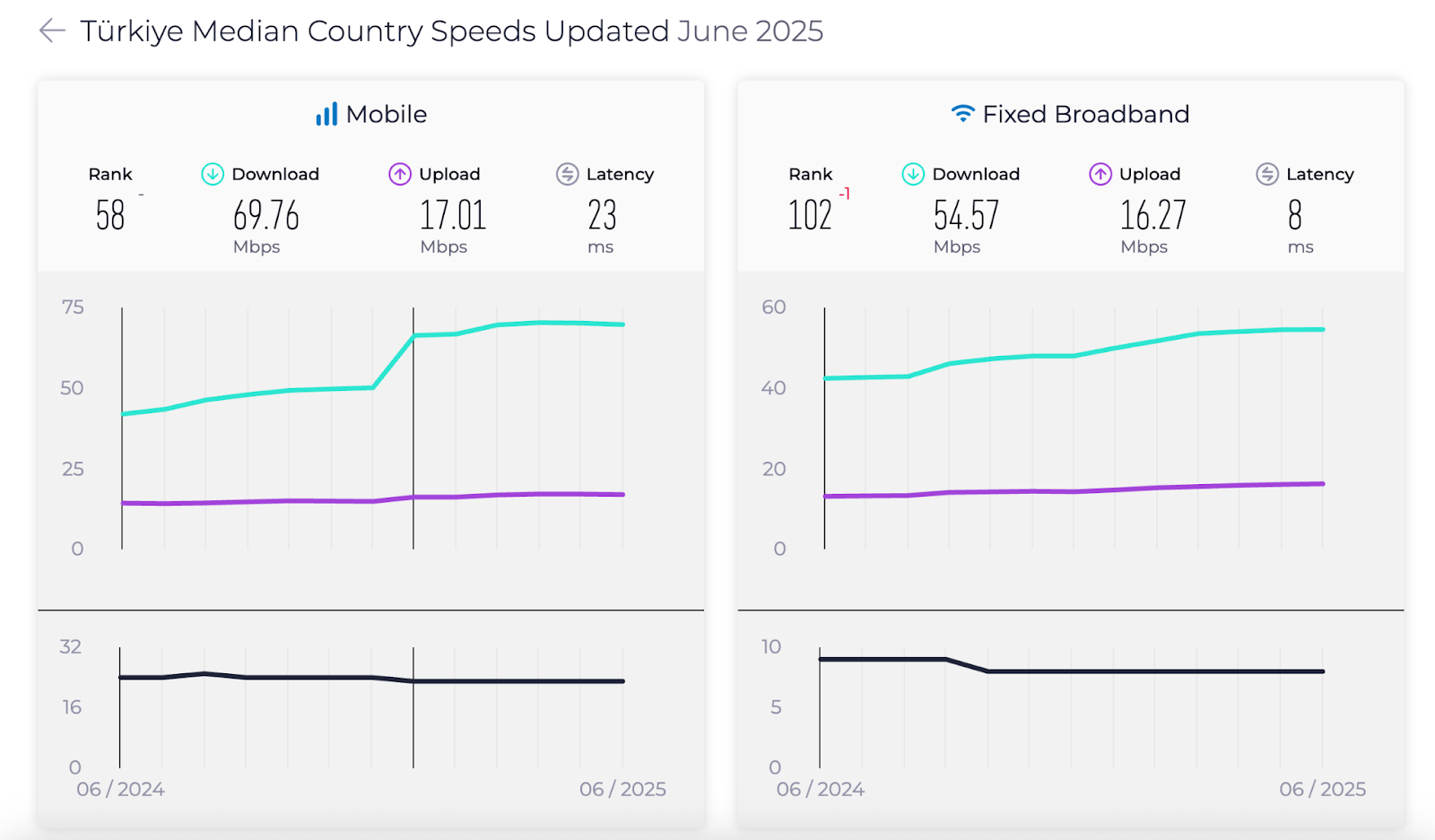
As far as SIM cards go, you can easily get a prepaid SIM at the airport or a phone shop. You’ll need to show your passport with the entry stamp to buy one. Providers like Turkcell, Vodafone, and Turk Telekom offer wide coverage. The SIM will be valid for 90 days. If you want to keep using it, go back to your provider with your residence permit.
One uniquely frustrating thing about using your mobile phone in Turkey is the IMEI lock. If you’re using a Turkish SIM card in a phone you brought from abroad, the network will block the device after 120 days. To keep it working, you’ll need to register it and pay a whopping 45,614 lira (about $1,124 as of July 2025). My workaround? I bought a cheap Android phone locally and used it as a personal hotspot.
Pros and cons of the Turkey digital nomad visa
Here’s a list of a few pros and cons of the Turkish digital nomad visa and living in Turkey in general.
Pros:
- Easy online pre-approval process
- Relatively affordable (if you live like a local)
- Access to coastlines, culture, and cuisine
- No local tax obligation if your income is foreign (sending money to Turkey? Find out the most efficient methods of doing so in our guide). If you’re in doubt about your tax situation, it’s always best to check with a local tax consultant.
At the moment, no — you don’t need to [pay taxes on income from abroad].
De jure, since the applicant receives a tourist residence permit, they are in the country as a tourist. Tourists are exempt from income tax.
{{Özgür Özcan}}
Cons:
- Limited info in English from official sources
- Prices fluctuate often due to inflation, especially rent and essentials
- Foreigners are often asked to pay 6-12 months’ rent upfront
- Bureaucracy can be slow and inconsistent depending on province
Getting a visa doesn’t guarantee a residence permit. The visa allows you to stay in Turkey for up to 90 days and gives you the right to apply for a residence permit, but the decision is still up to the migration office. At the moment, residence permits are granted for a maximum of two years — though again, this depends on the province. Some provinces will only grant 6 months even if you technically qualify for more.
{{Özgür Özcan}}
Conclusion
If you’re looking for a sunny, culture-rich place to work remotely, and you meet the eligibility criteria, Turkey’s new digital nomad visa is worth considering. It’s not the easiest process in the world (what visa ever is?), but it’s a big step forward. If you read this article and decided that Turkey is not for you after all, check out our guide on the best eight locations for digital nomads.
FAQ
Can I apply for the Turkey digital nomad visa online?
Yes, you start the application process online. Once you’ve been pre-approved, you’ll receive a Digital Nomad Identification Certificate with a barcode. You then take this certificate to a Turkish embassy or consulate in your country to apply for the actual visa.
Can I bring my family on this visa?
Yes, you can bring your family, but they’ll need to submit separate applications. The primary applicant applies for the digital nomad visa and, later, a residence permit. Spouses and children must submit their own residence permit applications through the Turkish Migration Department once you’re in Turkey. Make sure to prepare additional documents like marriage or birth certificates and check with your local consulate for any updates.
Do I have to pay taxes in Turkey?
At the moment, no — digital nomad visa holders don’t need to pay taxes in Turkey, as long as all your income comes from abroad and you don’t work with Turkish clients or companies.
What happens if I stay longer than 90 days without a residence permit?
If you stay longer than the duration of your visa, and don’t apply for a residence permit (or your application is rejected), you’re officially violating immigration laws. You’ll likely have to pay a fine at the airport when you leave. The exact penalty will depend on how many days you’ve overstayed, and also on your nationality. Usually it’s not huge, but if you’ve overstayed for months, you could also be temporarily banned from re-entry.
We are here to ease your working routine
Whether you're freelancing or a full-time contractor, we simplify the working process, putting you in control.
Try it free



Gig driving is one of the quickest ways to find job opportunities and make extra money. Check our complete guide for independent contractor drivers in 2026, with tips and best practices to help you earn more.
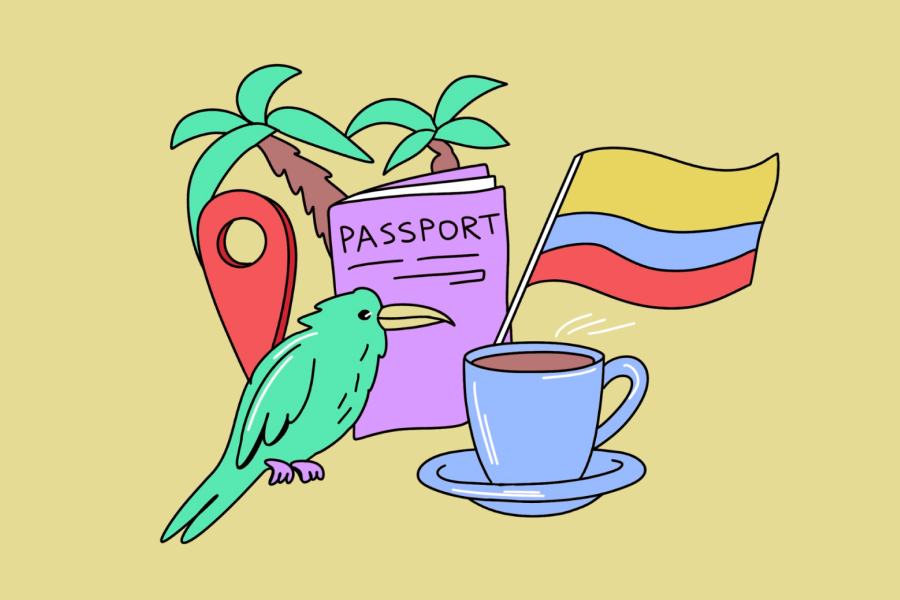
Colombia Digital Nomad Visa: learn how to apply, eligibility requirements, and best spots for remote work in one of the most biodiverse countries.

Discover the essential steps to become a copywriter, from understanding the role and choosing your career path to landing your first clients and scaling your rates. Learn which skills matter most, how to build a portfolio, and practical strategies to grow a sustainable copywriting career in 2026.


.JPG)